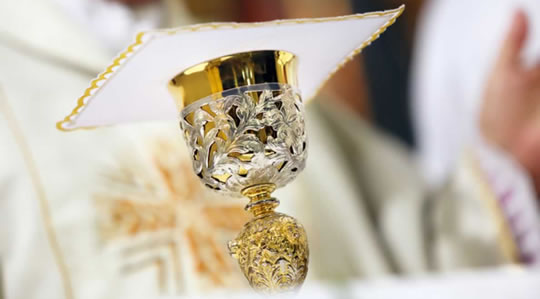






Can't find something you are looking for?
Let Catholic Directory know here and we'll see what we can do!

Mass Times, Confession & Reconciliation Times, Adoration & Benediction Times and other Prayer & Liturgy Times in Steyning, West Sussex BN44, UK and the surrounding area.
Click on the areas below to see information about local Catholic Parishes, Catholic Schools, organisations and chaplaincies.
1324 The Eucharist is "the source and summit of the Christian life. The other sacraments, and indeed all ecclesiastical ministries and works of the apostolate, are bound up with the Eucharist and are oriented toward it. For in the blessed Eucharist is contained the whole spiritual good of the Church, namely Christ himself, our Pasch.
1325 "The Eucharist is the efficacious sign and sublime cause of that communion in the divine life and that unity of the People of God by which the Church is kept in being. It is the culmination both of God's action sanctifying the world in Christ and of the worship men offer to Christ and through him to the Father in the Holy Spirit."
1326 Finally, by the Eucharistic celebration we already unite ourselves with the heavenly liturgy and anticipate eternal life, when God will be all in all.
1327 In brief, the Eucharist is the sum and summary of our faith: "Our way of thinking is attuned to the Eucharist, and the Eucharist in turn confirms our way of thinking."
Quoted from the Catechism of the Catholic Church
I. The Father-Source and Goal of the Liturgy
1077 "Blessed be the God and Father of our Lord Jesus Christ, who has blessed us in Christ with every spiritual blessing in the heavenly places, even as he chose us in him before the foundation of the world, that we should be holy and blameless before him. He destined us before him in love to be his sons through Jesus Christ, according to the purpose of his will, to the praise of his glorious grace which he freely bestowed on us in the Beloved."
1078 Blessing is a divine and life-giving action, the source of which is the Father; his blessing is both word and gift.4 When applied to man, the word "blessing" means adoration and surrender to his Creator in thanksgiving.
1079 From the beginning until the end of time the whole of God's work is a blessing. From the liturgical poem of the first creation to the canticles of the heavenly Jerusalem, the inspired authors proclaim the plan of salvation as one vast divine blessing.
1080 From the very beginning God blessed all living beings, especially man and woman. the covenant with Noah and with all living things renewed this blessing of fruitfulness despite man's sin which had brought a curse on the ground. But with Abraham, the divine blessing entered into human history which was moving toward death, to redirect it toward life, toward its source. By the faith of "the father of all believers," who embraced the blessing, the history of salvation is inaugurated.
1081 The divine blessings were made manifest in astonishing and saving events: the birth of Isaac, the escape from Egypt (Passover and Exodus), the gift of the promised land, the election of David, the presence of God in the Temple, the purifying exile, and return of a "small remnant." the Law, the Prophets, and the Psalms, interwoven in the liturgy of the Chosen People, recall these divine blessings and at the same time respond to them with blessings of praise and thanksgiving.
1082 In the Church's liturgy the divine blessing is fully revealed and communicated. the Father is acknowledged and adored as the source and the end of all the blessings of creation and salvation. In his Word who became incarnate, died, and rose for us, he fills us with his blessings. Through his Word, he pours into our hearts the Gift that contains all gifts, the Holy Spirit.
1083 The dual dimension of the Christian liturgy as a response of faith and love to the spiritual blessings the Father bestows on us is thus evident. On the one hand, the Church, united with her Lord and "in the Holy Spirit,"5 blesses the Father "for his inexpressible gift6 in her adoration, praise, and thanksgiving. On the other hand, until the consummation of God's plan, the Church never ceases to present to the Father the offering of his own gifts and to beg him to send the Holy Spirit upon that offering, upon herself, upon the faithful, and upon the whole world, so that through communion in the death and resurrection of Christ the Priest, and by the power of the Spirit, these divine blessings will bring forth the fruits of life "to the praise of his glorious grace."
Quoted from the Catechism of the Catholic Church
Those who approach the sacrament of Penance [also known as confession or reconciliation] obtain pardon from God's mercy for the offense committed against him, and are, at the same time, reconciled with the Church which they have wounded by their sins and which by charity, by example, and by prayer labors for their conversion."
Quoted from the Catechism of the Catholic Church